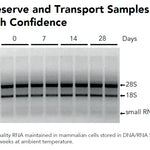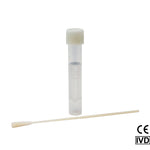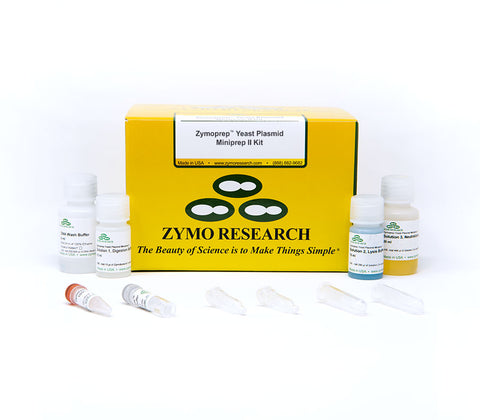Successfully Added to Cart
Customers also bought...
-
 DNA/RNA Shield (50 ml)Cat#: R1100-50DNA/RNA Shield reagent is a DNA and RNA stabilization solution for nucleic acids in any biological sample. This DNA and RNA stabilization solution preserves the...
DNA/RNA Shield (50 ml)Cat#: R1100-50DNA/RNA Shield reagent is a DNA and RNA stabilization solution for nucleic acids in any biological sample. This DNA and RNA stabilization solution preserves the... -
 DNA/RNA Shield SafeCollect Swab Collection Kit (1 ml fill) (1 collection kit)Cat#: R1160The DNA/RNA Shield SafeCollect Swab Collection Kit is a user-friendly collection kit for stabilizing the nucleic acid content of samples collected with a swab. DNA/RNA...
DNA/RNA Shield SafeCollect Swab Collection Kit (1 ml fill) (1 collection kit)Cat#: R1160The DNA/RNA Shield SafeCollect Swab Collection Kit is a user-friendly collection kit for stabilizing the nucleic acid content of samples collected with a swab. DNA/RNA...
Highlights
- Simple: Quickly and easily rescue plasmid from yeast.
- Efficient Isolation: Works well with low-copy and hard-to-isolate plasmids.
- High-Quality: Isolated plasmid DNA is ideal for molecular biology techniques, such as PCR, transformation, hybridization, etc.
Original Manufacturer
Satisfaction 100% guaranteed, read Our Promise
Innovated in California, Made in the USA
Highlights
- Simple: Quickly and easily rescue plasmid from yeast.
- Efficient Isolation: Works well with low-copy and hard-to-isolate plasmids.
- High-Quality: Isolated plasmid DNA is ideal for molecular biology techniques, such as PCR, transformation, hybridization, etc.
Original Manufacturer
Satisfaction 100% guaranteed, read Our Promise
Innovated in California, Made in the USA
| Cat # | Name | Size | Price | |
|---|---|---|---|---|
| E1004 | Zymolyase | 1000 U | $90.00 | |
| D2004-1-10 | Solution 1 Digestion Buffer | 10 ml | $22.00 | |
| D2004-2-10 | Solution 2 Lysis Buffer | 10 ml | $22.00 | |
| D2004-3-20 | Solution 3 Neutralizing Buffer | 20 ml | $22.00 | |
| D4003-2-6 | DNA Wash Buffer (Concentrate) | 6 ml | $12.00 | |
| C1001-50 | Collection Tubes | 50 Pack | $18.00 | |
| C1003-50 | Zymo-Spin I Columns | 50 Pack | $60.00 | |
Description
Performance
Technical Specifications
| Applicable For | Plasmid DNA is well suited for downstream applications such as PCR, transformation, hybridization and other sensitive applications |
|---|---|
| Elution Volume | ≥ 10 µl |
| Equipment | Microcentrifuge & Heat Block/Bath |
| Processing Volume | ≤ 1.5 ml of Culture |
| Sample Source | Cell Culture (Colonies/Patches or Liquid Culture) |
| Size Range | Up to 23 kb. |
| Yield | Typically between 0.01-0.3 ng for most 2 µ based plasmids from 1.5 ml overnight cultures |
Resources
Documents
FAQ
Both the Zymoprep Yeast Plasmid Miniprep I and II utilize the same chemistry for lysis; however, Miniprep I uses isopropanol precipitation and Miniprep II utilizes a column for purification. The Miniprep II allows for consistent yield and purity; and samples can be concentrated to a low elution volume.
Typically, between 0.01 - 0.3 ng for most 2 µ based plasmid from 1.5 ml overnight cultures. In order to generate more plasmid, the plasmid is typically transformed into E. Coli, cultured, and isolated using a traditional E. Coli plasmid prep.
Yes
We generally recommend working with fresh or early log phase cells, which are easier to lyse. For stationary phase cells, user optimization is necessary, and we recommend increasing digestion to > 1 hour and/ or increasing the amount of Zymolyase.
Any strains susceptible to Zymolyase, which includes: Susceptible fungal genera: Asbya Kloekera Candida Kluyveromyces Debaryomyces Lipomyces Eremothecium Metschikowia Endomyces Pichia Hansenula Pullularia Hanseniaspora Saccharomyces Saccaromycodes Saccharomycopsis Schizosaccahromyces Torulopsis
Citations
Need help? Contact Us




